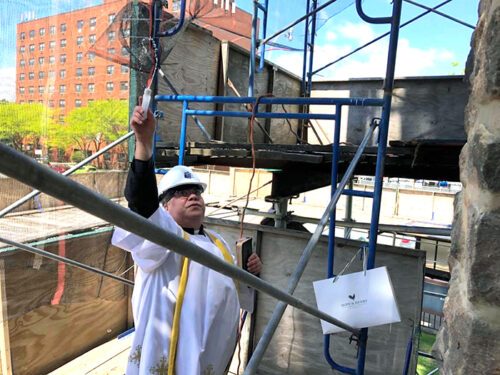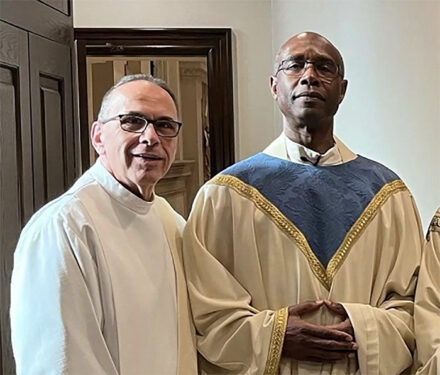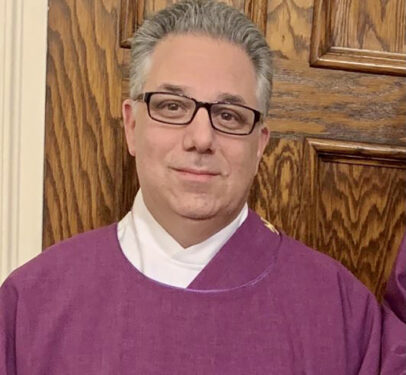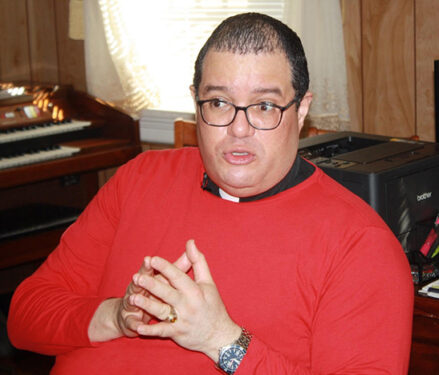
Pastors delegate duties, faithfully pray to complete tasks
PROSPECT HEIGHTS — Student priests are versed in philosophy, theology, and the Bible, so that they’re prepared to stand as a living example of the Gospel.
But sometimes, a priest who becomes a pastor faces new realities, like budget shortfalls, old buildings that need expensive repairs, or fundraisers to make up for a drop in weekly collections because of a pandemic.
[Related: Workshops, Life Experiences, Help Prepare Seminarians for Realities of Parish Management]
Father Bryan Patterson, pastor of Cathedral Basilica of St. James in Downtown Brooklyn, was a businessman before he entered the seminary. One might assume that he’s no stranger to bean-counting, spreadsheets, and fundraisers, but he makes one thing clear: his main job is preaching the Gospel of Jesus Christ.
That’s not to say building renovations, personnel management, and parish finances aren’t important. But many pastors struggle with completing those tasks while trying to focus on presenting the Gospel.
In 2009, then-Bishop of Brooklyn Nicholas DiMarzio started a program to develop parish business managers — deacons and laity — to let priests focus on other pastoral duties.
Father Patterson said he shares responsibilities with Deacon Ronald Rizzuto, a retired school principal who has solid connections throughout the diocese. Together they work with the parish council to get things done.
During his career in the business world, Father Patterson “worked in a lot of places,” including American Express, Orion Pictures, and L’Oréal.
But as a pastor he chooses not to worry about fiscal matters because his ministry, he says, is based on Matthew 6:33: “But seek first the kingdom (of God) and his righteousness, and all these things will be given you besides.”

With that mentality, the Cathedral’s parish manages to chalk up financial successes. In January it ushered in its bicentennial anniversary marking 200 years of service at the parish, and also 200 years of the Catholic Church on Long Island.
More events are planned later this year, such as a concert, which all cost money.
Father Patterson noted that his parish always reaches its fundraising goals — such as the Annual Catholic Appeal. Even so, he says, “To me, there’s a real danger with trying to win, to be No. 1, to raise more money through more activities, without having the Kingdom of God as a center of what you’re doing.”
Deacon Dean Dobbins is the business manager for two parishes — Our Lady of Mercy in Forest Hills, Queens, and St. Catharine of Alexandria in Borough Park, Brooklyn.

He is a former NYPD detective who also had a career in information technology for a large sales organization. Thus, he responded to Bishop DiMarzio’s call for people with business experience to help pastors.
“As a businessman, I think it has been very successful,” Deacon Dobbins said. “When Bishop DiMarzio did this — and it was called the ‘pilot program’ — we did have business managers, but they were really there for financial reasons.”
But, at the two parishes he serves, Deacon Dobbins oversees all facets of parish operations, including building construction, physical maintenance, finances, and human resources, to name a few. He also was a business manager for St. Augustine Parish in Park Slope.
“It’s not an easy job,” he said. “I’m not perfect — Jesus is. I make mistakes like everybody else. But God gets you through your day. Once you are settled in, everything can run smooth.”
Father Manuel de Jesus Rodriguez has presided over day-to-day operations and special fundraisers at two Queens parishes — Presentation of the Blessed Virgin Mary Church in Jamaica, and his current post at Our Lady of Sorrows, Corona.
At Presentation, he guided a $1.8 million renovation of the church tower, which had become unsafe. He now has a similar but smaller-scale project at Our Lady of Sorrows, this time to fix the bells in the tower and its large clock.
Father Rodriguez does not have a business manager, so he delegates tasks to the staff.
Still, he relies on his own abilities to follow up on assignments while keeping his mind open to learn more. These skills can take time for a pastor to develop.
“Figuring out the complexity of the job is sort of like shock therapy,” he said. “For example, I was never told during my training process, which was over 12 years, that I had to deal with simple boiler issues or sewage explosions.

“This kind of job can only be done by someone who is convinced that God is calling you. And somehow God will make sure that you don’t die before your time.”
The ideas of Fathers Patterson and Rodriguez align with coursework at St. Joseph’s Seminary and College, Dunwoodie, Yonkers.
Father Michael Bruno, dean of seminarians, said faith has got to be the unifying power that helps a future priest learn to be flexible, eager to learn, and not be afraid to ask for help.
These challenges coincide with a nationwide shortage of priests, he added.
“So, bringing in deacons or lay faithful who can assist, especially on the administrative side, can be a real help,” he said. “But it is their prayer, their own study, and their own foundations upon Christ that is going to sustain pastors in tough times when they have to make difficult decisions administratively.”
